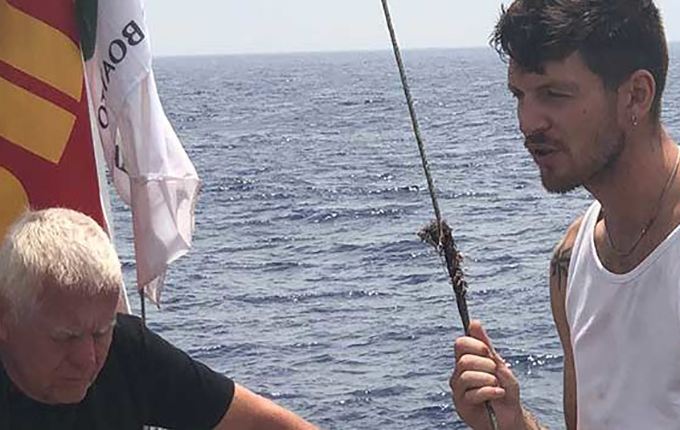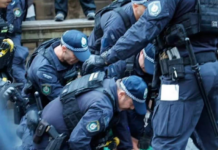By Chris Graham on board the Al Awda
If you’re an optimist, then I’m about 24 hours from Gaza. If you’re a pessimist, then I’m about 24 hours from witnessing a violent raid by the Israeli Defence Force on the Al Awda, the lead boat in the 2018 Freedom Flotilla which is aiming to break the decade long naval blockade imposed on the Palestinian people of Gaza.
I joined the Flotilla a week ago, in Sicily, Italy. We’ve sailed for seven days, straight down the middle of the Mediterranean. As I write, we’re not far off the coast of Egypt.
Contrary to popular belief, the Freedom Flotilla’s primary aim is not to deliver humanitarian aid to the people of Gaza, although it is carrying much needed medical supplies on board (and the boats, if they make it through, will be donated to a Palestinian union to help contribute to an economic base for a ravaged people).
The Flotilla’s primary aim is to break the naval blockade and bring international attention to the plight of Palestinians, a people who have suffered under a brutal Israeli occupation since 1967, the last time the Gaza sea port was officially open for business.
On that front, the Freedom Flotilla does very well.
This is not a big story in Australia (or New Zealand) – we find our own ways to oppress people, like those detainees on Manus and Nauru. So the indefinite detention of more than 2 million Palestinians in Gaza is hardly newsworthy in Australian media eyes.
Indeed, we only really ever hear about Gaza when Israel unleashes another slaughter, like it did a few weeks ago when more than 140 unarmed Palestinian protesters were shot dead – and thousands more injured – for approaching the border fence between Gaza and Israel to protest their right to return to their lands.
Significant story
But the Flotilla is a significant story internationally. Thousands and thousands of column centimetres have been filed in papers around the globe as, for the past two months, four ships – Al Awda, Freedom, Falestine and Mairead – have sailed throughout Europe, visiting multiple countries including Sweden, Norway, Denmark, England, France, Spain, Portugal and Italy.
It’s also captured the imagination of the television media – on board Al Awda is a crew from Al Jazeera, an international news service based in Qatar. On board Freedom is a crew from Press TV, a service out of Iran.
Notably though, I’m the only western journalist on board (although the Press TV journalist is British, based in London). Richard is Muslim, brown and a journalist for a service beamed from a nation that has long been at war with Israel – I won’t be surprised if he’s singled out for a special welcome by the IDF, an army that describes itself as ‘the most moral on earth’, while imposing a ‘perfect Apartheid’ on the people of Gaza and the West Bank, and while shooting unarmed men, women and children for approaching a fence.
This is the same IDF that, eight years ago, raided the 2010 Freedom Flotilla, killing 10 passengers including two journalists. At least six of those passengers were found by a United Nations report to have been summarily executed. Hundreds more, the same UN report found, were tortured by Israeli soldiers and officials, while dozens were badly beaten at Tel Aviv airport by Israeli police – a kind of ‘Israeli farewell’ for peace activists with the audacity to try and shine a light on the actions of a state that daily breaches countless international laws, and basic human rights.
All of these facts about modern day Israel are known by the people participating in the 2018 Freedom Flotilla, and yet still, they come.
Three dozen of them from countries all over the world – New Zealand, Malaysia, Singapore, Canada, America, Great Britain, France, Germany, Italy, Spain, Norway, Denmark, Sweden, Morocco, Algeria.
They also know what awaits them if (and when) the IDF does attack – a brutal boarding, and a stint in an Israeli prison followed by deportation which will make any future international travel to nations aligned with Israel substantially more difficult.
Talking to activists
I’ve spent days talking to activists like Joe, and Jan, and Charlie, and Jonathon, each of whom have already completed one Flotilla (some of them multiple Flotillas).
They keep coming back because nothing has changed. In fact, things have gotten worse, and not just in Gaza.
Every day, Israel expands more and more Jewish settlements into Palestinian land in the West Bank, a flagrant breach of international law done under the watchful and helpful eye of the United States, which uses its power within the United Nations to block any sanctions – and most criticism – of Israel.
For Australia’s part, we generally side with the Americans, either by voting with her or abstaining – we’re not a big enough, powerful enough nation to bully on a truly global scale, so we hide behind one instead.
That’s been one of the more eye-opening parts of this trip – with so many people from so many parts of the world living in such close quarters for an extended period, you get to learn a lot about other nations, and what they think about yours.
There’s a Kiwi on board with me, Mike Treen, a union leader from NZ. He’s really the only passenger with any deep understanding of Australia and the crimes our nation commits – and the ones we choose to ignore from others – in order to ensure a life of privilege and relative wealth.
Most of the rest of the crew and passengers see us as not much more than a “friendly nation of convicts” with kangaroos, BBQs and dangerous wildlife.
Lunar eclipse
Talk turned to that last night, as the crew and passengers gathered on the top deck to watch a full moon lunar eclipse, an event predicted decades ago, and not to be repeated for more than 100 years.
I enjoyed the irony of the symbolism. The ultimate outcome of the Freedom Flotilla – a raid by the IDF and the assault and jailing of peace activists – was also predicted a long time ago. Although it’s likely to be repeated again next year, or the year after.
Under the lunar eclipse, I asked the captain of the Al Awda, a 27-year-old Norwegian sailor named Herman, why he would risk jail, and worse, to bring attention to the brutalization of a people he’s never met, a nation he’s never visited.
“Change starts with the people. It always has,” said Herman.
“The point of this trip is to inspire people to bring about that change.”
New Matilda editor Chris Graham reported earlier today from the Al Awda, a lead ship steaming through the Mediterranean Sea about 24 hours [at that time] from an attempt to break the Israeli naval blockade on the Palestinian people of Gaza. Asia Pacific Report is sharing content with Kia Ora Gaza and Scoop Media.











































[…] Source link […]
[…] https://asiapacificreport.nz/2018/07/29/2018-freedom-flotilla-a-predictable-end-to-an-unpredictable-… […]
Comments are closed.